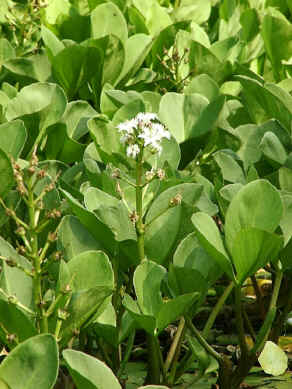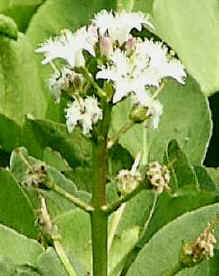Information on Selected Wetland Species
Bogbean
Menyanthes trifoliata L.

| Habitat | An emergent plant at the fringe of lakes or slowly flowing rivers.
Also in pools and wet flushes. Pure stands of Bogbean can often be found where the
emergent zone gives way to open water. (Plant Zonation). It occurs over a wide range of soil types, from organic to inorganic, acidic to calcareous and over a wide range of nutrient levels. It can be found from sea-level to over 1000m. |
|
| Structure | A perennial plant, losing its leaves over the winter. It may have floating rhizomes which grow out from the bank, sometimes forming a thick floating mat. It has very distinctive three-lobed leaves. The rhizomes are used medicinally in Ireland. | |
| Reproduction |  |
This is an early
flowering species, flowering from April through to July. The flowers are white, tinged
with pink and are hairy inside. Like Primroses, they have two different kinds of flowers, pin and thrum, each produced on separate plants. These flowers differ in the length of the style ), with pin eyed flowers having a long style and the thrum, a short style. This is an adaptation which ensures cross pollination by insects. (Flower Structure and Pollination.The two different kinds of plants tend not to grow together. The pollen of thrum plants is less viable than that of pin plants. (For a fuller description of pin and thrum flowers, see Primrose. |
| Dispersal | The seeds are dispersed
by water. They float and can remain floating for up to 15 months. The seeds only germinate
once the hard seed coat has been ruptured. Established colonies also spread vegetatively, by growth of the rhizome. They can eventually occupy very large areas of open water. |
|
| Geographical Range |
It is widely distributed throughout the British Isles. It is commonest in the south and west, but scarce in parts of the Midlands. It occurs throughout the temperate northern hemisphere. | |
Sources of Information
Aquatic Plants in Britain and Ireland. C.D. Preston and J.M. Croft. Harley Books, 1997.
British Water Plants.
S. Haslam, C. Sinker and P. Wolseley. The Field Studies Council 1975
(1982 ed.)